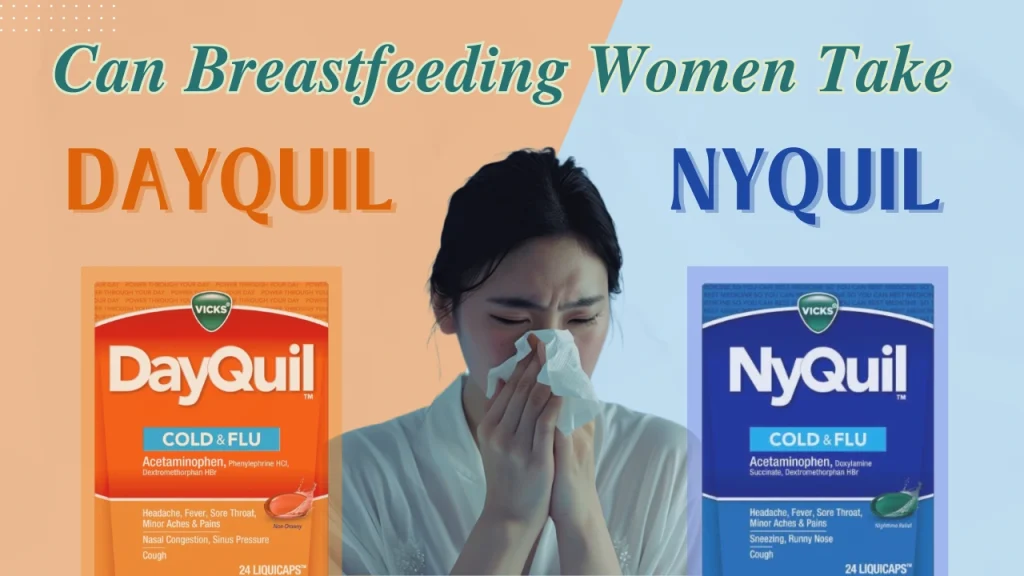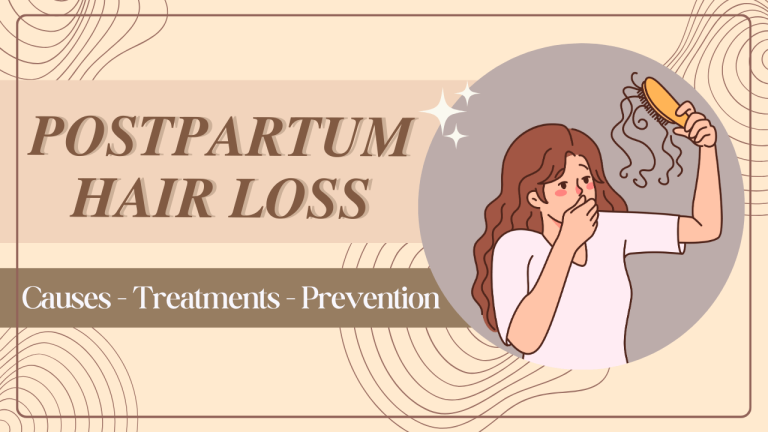
Having a cold or flu while breastfeeding is certainly not an easy experience for mothers. Although a common cold usually resolves with home remedies and rest, the uncomfortable symptoms of a cold or flu may lead some breastfeeding mothers to consider using popular over-the-counter medications like DayQuil and NyQuil to alleviate their discomfort. However, not all ingredients in these products are safe for both the mother and the baby. Some may affect milk production or transfer harmful substances to the baby through lactation.
This article will answer questions about whether you should continue breastfeeding while sick, the impact of using DayQuil & NyQuil on newborns, and offer safer alternative solutions.
Should I continue to breastfeed my child while sick?

Yes, just keep breastfeeding your child even if you are sick. Common illnesses like colds, fever, flu, vomiting, diarrhea, and even COVID-19 cannot be passed to your child through breast milk. So, mothers do not need to worry too much and stop breastfeeding then.
Breast milk will provide all necessary nutrients to your child and substances with unique immunological and anti-inflammatory properties so that breastfeeding can protect both mother and child from many diseases. Most countries in both the developed world, such as the USA, and the developing world acknowledge the health advantages of breastfeeding.1
Benefits of breastfeeding while sick
Besides the above benefits, there are additional advantages when a sick mother continues to breastfeed:
- Provide antibodies: When one is sick, antibodies are produced in the body to deal with the sickness and are provided to the child through the mother’s breast milk. These antibiotics boost their immune system and reduce the risk of getting the same illness.
- Maintain milk supply: Continuing to breastfeed helps keep up the milk supply and prevents issues like blocked milk ducts that can occur if breastfeeding is suddenly stopped.
Important notes when taking medication while breastfeeding
So when a mother is ill and needs to take medication but must also breastfeed certain factors need to be taken into account, especially for premature babies and newborns. Here are some specific notes:
- Age of the baby: Premature babies and newborns have weak immune and digestive systems. Therefore, they are more sensitive and at a higher risk of negative effects from the ingredients in breast milk than others. The risk decreases as the child gets older, about two months old, and more
- Proportion of milk received from breastfeeding
- Time influence: The level of a medication in breast milk can vary depending on the time between taking the medication and the next feeding session.
Two of the most important notes include:
- Potential effects of medication on breast milk production: Certain drugs may cause a decrease or an increase in breast milk supply.
- Effects of medication on the health and safety of the baby: Although most medications pass into breast milk at low levels and do not pose a real danger to most infants, there are exceptions where some medications can appear at high levels in breast milk and impact the overall health of the baby.
About Dayquil and Nyquil?
DayQuil and NyQuil are popular over-the-counter (OTC) combination drugs that help reduce symptoms of colds and flu, such as coughing, nasal congestion, sore throat, fever, and headaches. The main difference between DayQuil and NyQuil lies in their ingredients, which leads to different uses.
DayQuil is a daytime version. DayQuil combines three main ingredients: Acetaminophen – the same active ingredient as Tylenol; Dextromethorphan is a cough suppressant; Phenylephrine – a decongestant; and Guaifenesin – an expectorant that loosens phlegm to help coughing it out.
On the other hand, NyQuil also includes Acetaminophen and Dextromethorphan. However, it contains Doxylamine, an Antihistamine that aids in sleeping instead of Phenylephrine. Therefore, NyQuil is more suitable for nighttime use.
Can Breastfeeding women take Dayquil or Nyquil?
Mothers should avoid using DayQuil and NyQuil while breastfeeding. Each active ingredient in NyQuil works differently and impacts your breastfeeding child in various ways. Some of them can negatively affect milk production as well as the health of the baby. Read on to find out more about each ingredient of Dayquil-Nyquil and how it affects both moms and children.
Acetaminophen (in both Dayquil and Nyquil)
Acetaminophen is a non-aspirin pain reliever. According to the American Academy of Pediatrics, it is safe to use while breastfeeding2.
A very small amount of acetaminophen will transfer into breast milk, peaking about 1 to 2 hours after taking the drug. Only about 0.14% of the mother’s dosage is passed to the baby. This level is only about 0.5% of the lowest recommended dose for newborns3. Reports indicate that there are no other side effects in newborns when mothers take acetaminophen4. The only rare side effect reported in breastfed infants is a rash, but this symptom will go away when the medication is stopped.
However, you should only take the medication when necessary and never exceed the recommended dosage.
Dextromethorphan (both in Dayquil and Nyquil)
Dextromethorphan is a cough suppressant. Although a small amount goes into breast milk, it is unlikely to harm the baby, especially those over 2 months old. Overall, the evidence suggests that the clinical advantages of dextromethorphan outweigh its potential dangers.
Phenylephrine (in DayQuil)
Phenylephrine is a vasoconstrictor used in a nasal decongestant spray. The main effect of phenylephrine is not on the health of the baby but on the amount of breast milk. Phenylephrine affects the prolactin hormone5, which can restrict blood flow to the milk glands and result in a low milk supply. While phenylephrine is not very absorbed, and the amount of the medicine that may pass through breast milk is small, certain research shows that it leads to irritability in the baby.
Lack of information regarding the safety of the medication when used during breastfeeding means that the medication should be replaced with other ones particularly when nursing newborn and premature babies.
Doxylamine (in NyQuil)
Doxylamine is an antihistamine that has sedative effects. Mothers should not panic much if they have taken Doxylamine since it can be taken in small amounts. But, there are some side effects if the doses are high or if the use is prolonged for a long time, it could lead to drowsiness, irritability, or crying in newborns. Further, Doxylamine can also reduce the production of milk as it will stop all secretions, especially when used with a vasoconstrictor like phenylephrine. Therefore, breastfeeding mothers should consult a doctor before using Doxylamine to ensure safety for both mother and baby.
With these impacts in mind, breastfeeding mothers should consult a doctor before using DayQuil or NyQuil. The doctor can then recommend safe treatments for the nursing child and explain his views on whether the benefits of these drugs are worth the risks. Other possible safer approaches to managing the symptoms during breastfeeding might also be advised.
Alternatives
When looking for alternatives to DayQuil and NyQuil, breastfeeding mothers should consider gentler and potentially safer choices. Here are a few suggestions:
Safe cold medication
- throat lozenges
- Nasal decongestant sprays: For nasal congestion symptoms, nasal decongestant sprays such as Afrin or Sinex can be helpful, but it’s important not to use them for more than three consecutive days to avoid rebound congestion.6
- Acetaminophen (Tylenol): Instead of using combination medications that may affect milk supply, it is advisable to use single ingredients like acetaminophen (Tylenol) for pain relief and fever reduction, as it is safe for breastfeeding women.
Natural remedies
When breastfeeding and needing to treat cold symptoms, mothers can safely and effectively use home remedies. Everyone should take honey for its antibacterial properties and antioxidants that are good when it comes to cough and congestion.
Additionally, resting and getting enough sleep are extremely important to boost the immune system and recover health. Taking a lot of water when sick aids the body in flushing out bacteria from the system. Gargling with warm salt water is also a useful method to soothe a sore throat, and inhaling steam can help reduce nasal congestion. These measures are not only safe but also help mothers avoid using medications that could affect milk supply and the health of the baby.
You can resume using DayQuil or NyQuil after you have stopped breastfeeding or if your doctor says it’s okay after checking on both your and your baby’s health. If you are still breastfeeding, consult your doctor to ensure it is safe for your baby before taking any medication.
Yes, the medication a mother takes can pass through breast milk and affect the newborn. The extent to which the drug passes into the milk depends on the drug’s characteristics and the dosage used.
Conclusion
Breastfeeding moms should be careful with all the medications one takes, especially in cold and flu meds. Many of the cold medicines that are available without a prescription, for example, NyQuil and DayQuil, may contain compounds that are not suitable for you or your baby. Therefore, it’s best to pick safer alternatives that will not harm either of you. Always make sure to consult a doctor or a breastfeeding specialist before taking any medication.
Sources
- Office of the Surgeon General (US) 2011. The Surgeon General’s Call to Action to Support Breastfeeding. ↩︎
- The Transfer of Drugs and Other Chemicals Into Human Milk. AMERICAN ACADEMY OF PEDIATRICS 2001 ↩︎
- Carmen Pope, BPharm (2024). Is Nyquil safe to take while breastfeeding? ↩︎
- Berlin CM, Jr, Yaffe SJ, Ragni M. Disposition of acetaminophen in milk, saliva and plasma of lactating women. Pediatr Pharmacol 1980;1 ↩︎
- Drugs and Lactation Database: Phenylephrine (2006). National Institute of Child Health and Human Development ↩︎
- Paul IM. Effect of honey, dextromethorphan, and no treatment on nocturnal cough and sleep quality for coughing children and their parents. Arch Pediatr Adolesc Med. 2007;161(12) ↩︎






